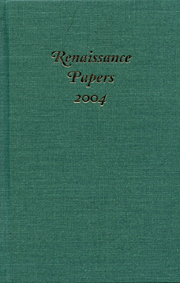Book contents
- Frontmatter
- Contents
- Renaissance Papers
- All Ovids Elegies, the Amores, and the Allusive Close of Marlowe's Hero and Leander
- Revisiting Shakespeare's Eliot
- “'Tis Rigor and Not Law”: Trials of Women as Trials of Patriarchy in The Winter's Tale
- Crossing Wits: Donne, Herbert, and Sacramental Rhetoric
- Love and Power: The Rhetorical Motives of John Donne's 1622 Sermon to the Virginia Company
- Crashaw, Catholicism, and Englishness: Defining Religious Identity
- Addendum
- Beyond “no end”: The Shape of Paradise Lost X
Beyond “no end”: The Shape of Paradise Lost X
Published online by Cambridge University Press: 12 September 2012
- Frontmatter
- Contents
- Renaissance Papers
- All Ovids Elegies, the Amores, and the Allusive Close of Marlowe's Hero and Leander
- Revisiting Shakespeare's Eliot
- “'Tis Rigor and Not Law”: Trials of Women as Trials of Patriarchy in The Winter's Tale
- Crossing Wits: Donne, Herbert, and Sacramental Rhetoric
- Love and Power: The Rhetorical Motives of John Donne's 1622 Sermon to the Virginia Company
- Crashaw, Catholicism, and Englishness: Defining Religious Identity
- Addendum
- Beyond “no end”: The Shape of Paradise Lost X
Summary
For many students, the drama of Paradise Lost peaks early in the epic and wanes after Book IX. Not only does that book contain the central episode “Of man's first disobedience” (I.1) announced at the outset of the epic, it neatly satisfies expectations set up by the narrator's announcement “I now must change/ Those notes to tragic” (IX.5-6). Within an emphatic frame provided by the opening and closing phrases, “No more” (IX.1) and “no end” (IX.1189), Milton presents the Fall in five easily perceived parts, a dramatic structure emphasized by recurrent theatrical images. In their immediate context, the words “no end” in the final line of Book IX deny both purpose and conclusion to the recriminations of Adam and Eve. In the context of the epic as a whole, the phrase holds out the prospect of moving beyond loss to a happier resolution. Some readers, however, are by this point longing for a place of rest, with or without Providence as their guide, and dismayed that there is a great deal of text still to come.
By line-count, a little over twenty-five percent of the epic yet remains unsung. In the first ten-book edition of Paradise Lost (1667), with a fifth of the books remaining, this was perhaps not quite as obvious as it is in the edition we now read.
- Type
- Chapter
- Information
- Renaissance Papers 2004 , pp. 131 - 139Publisher: Boydell & BrewerPrint publication year: 2005

